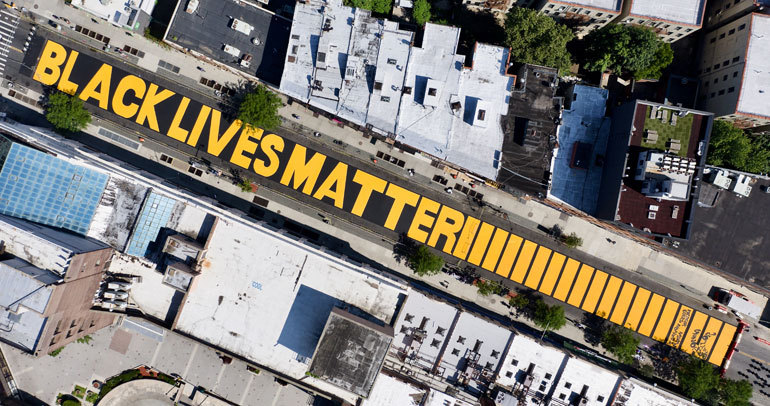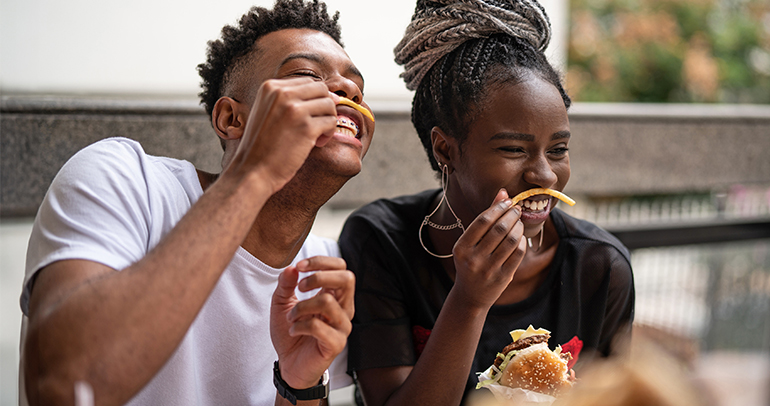
Something is happening in brand land. The Black Lives Matter movement has revealed the better angels within the nature of some of the world’s leading brands. Sure, we’ve seen missteps and opportunism from some brands, and we’ve heard deafening silence from others. But in the name of optimism, let’s assume that when brands act from a place of purpose, they can affect positive social change. That’s a glorious thing. This article takes a look at three key transformations:
1) Why consumers are holding brands to a higher bar.
2) How a shift from cause marketing tactics to purpose-led action is making brands better citizens.
3) What five best-in-class, purpose-led brands are doing to forward racial justice.
Recent consumer research published in Adweek shows consumers want brands to take a stand. According to a survey of 2,000 US consumers, a majority (56%) agree that brands have a moral obligation to speak out against racial injustice. The survey showed that 60% said brands must invest in addressing racial inequality’s root causes, and 57% said brands have a duty to educate the public.
It’s the moral obligation and the duty to act that is particularly compelling. Consumers are essentially telling brands that messages of support are not enough. Brand trust is built upon tangible action. When they see a company taking a position that could be perceived as negatively impacting the bottom line —and doing it anyway, that company is taking a moral position.
Here’s the thing. A moral position can’t come from the marketing team. This is the difference between cause marketing and purpose-led brands. Cause marketing is about aligning a brand with a cause that could potentially elevate brand perception. Cause marketing is a tactic. It’s about supporting social causes that are a ‘good match’ and borrowing equity from that cause to enhance your brand. Think of cause marketing as Australopithecus. It is the evolutionary link between the ancient ape of corporate charity and the evolved humanity of purpose-led brands.
Consumers want to know: Why does your company exist beyond delivering profit? If you can’t answer that question, you have no purpose. Luckily, many companies can answer that question. And many have invested heavily in purpose-defining strategic exercises to ensure their purpose lies at the heart of their entire business model.
Purpose leans in. Purpose-led brands know their actions may not please everyone. They know it is about more than slipstreaming off sympathetic causes. Perhaps Unilever CEO Alan Jope said it best, “Purpose-led brand communications is not just a matter of ‘make them cry, make them buy.’ It’s about action in the world.”
Here’s How Five Brands Are Acting With Purpose in the World Right Now
NIKE
In a somber sixty-second video with no music, against a solid black slate: “Don’t pretend there’s not a problem in America. / Don’t turn your back on racism. / Don’t accept innocent lives being taken from us. / Don’t sit back. Don’t be silent.” It is a bold repurposing of one of the world’s most famous taglines: “For Once, Don’t Do It.”
Nike was at the forefront of the Black Lives Matter movement. In 2018 they chose Colin Kaepernick as the face of the 30th anniversary of the ‘Just Do It’ campaign. The decision led to a spate of sneaker burnings but sticking to purpose paid off for the brand. The company claimed the Kaepernick campaign led to $163 million in earned media, a $6 billion brand value increase, and a 31% boost in sales.
One could argue that the latest video is just more words. But Nike goes beyond words by committing $40M to organizations that fight racial inequality and promote social justice. The brand has a demonstrable track record of standing up for social causes, from gender equality to disability rights. These actions are right in line with its brand purpose —to expand human potential.
BEN & JERRY’S
Unilever owned Ben & Jerry’s —a model purpose-led brand, has been consistent in its support of the Black Lives Matter movement since 2016, along with other progressive issues. But in 2020, they moved beyond lending broad support to demanding specific action. If 2016 was a statement of heartfelt solidarity, 2020 was a full-throated takedown of white supremacy. Ben & Jerry’s is demanding Congress pass H.R. 40, legislation that would create a commission to study the effects of slavery and discrimination. The brand also called upon the Department of Justice to reinstate policies rolled back by the current administration, specifically policies designed to curb police abuses. And finally, Ben & Jerry’s called out President Trump by name, asking that he not use his Twitter feed to spoon-feed white supremacists and nationalist groups.
Again, it is arguable that these words demanding action are not actions themselves. But Ben & Jerry’s also builds purpose into its product. The latest example is “Justice Remix,” an ice cream flavor introduced last year. A portion of the proceeds goes to the Advancement Project, a racial justice nonprofit. The brand has done this before, with limited-run flavors like “Together Pecan Resist” and “EmpowerMINT,” with a portion of proceeds going to fight voter suppression.
LEGO
The Danish toy company has pledged $4M to support Black children and educate all children about racial equality. Additionally, they have paused all digital marketing of playsets that include police figures and scenarios. This includes 30+ playsets with names like “Police Helicopter Chase” and “Police Dog Unit.” To be clear, the brand has not removed products from shelves. But it has paused digital advertising in response to US events. The move signals LEGO’s openness to listen and evolve. It signals an understanding that while there may be nothing inherently wrong with one of its product lines, this moment matters, and profits can wait.
VIACOM
Viacom, which includes youth and entertainment brands like Nickelodeon, MTV, BET, and Comedy Central, went dark for 8 minutes and 46 seconds, the amount of time George Floyd had a knee on his neck that ended his life. Against a plain black slate, the words “I can’t breathe” fade in and out, in sync with the sound of labored breathing. The ending call-to-action drives to the racial justice organization, Color of Change.
The blackout may not seem like a particularly bold move when running on networks like BET or Comedy Central. But Viacom drew criticism for running it on Nickelodeon, with some parents saying it unnerved them and their children. In response to criticism, the company replied on Facebook, “Unfortunately, some kids live in fear every day. It’s our job to use our platform to make sure their voices are heard and their stories are told.” A few days later, Nickelodeon pledged $5M to a handful of organizations, including the NAACP Legal Defense Fund.
Nickelodeon’s actions were completely in line with its brand purpose. Prior to the 8:46 tribute, the network aired its “Declaration of Kids’ Rights” which it first shared 30 years ago. Among those rights is “the right to be treated with equality, regardless of the color of your skin.” The brand’s purpose has not changed.
YORKSHIRE TEA
And finally, tea. Unless you count the Boston Tea Party, tea isn’t known for its radicalism. But when a far-right vlogger tweeted her support to British brand Yorkshire Tea for not taking a stand on Black Lives Matter, the brand politely responded with “Please don’t buy our tea again.”
PG Tips, a tea competitor owned by Unilever, lent support to its rival brand by tweeting, “If you are boycotting teas that stand against racism, you’re going to have to find two new brands now #blacklivesmatter #solidaritea.” It’s a quiet move for both brands, but one that signals a willingness to put purpose over profit.
Actions Speak Louder
What’s happening in brand land mirrors what’s happening across the US and many parts of the world. People are beyond bromides. They want action.
The Adweek research shows 60% of American consumers said they are watching how brands respond over the next several weeks, and that response will influence whether they buy or boycott. And 37% say they are encouraging family and friends to stop or start using a brand, depending on that brand’s stand on racial equality.
In some ways, this is good news for brands that may have been slow to step up immediately with a thoughtfully worded, black-squared Instagram rebuke. Because an ad is not enough. What’s next? We can expect a spate of ‘woke-washing’ messages from formerly silent brands claiming Black Lives Matter, and it’s what they believed all along. But perhaps we’ll also see reflective brands, reminded of their purpose, coming forward to actively make a difference.
Escalent helps brands find and live their purpose through insight.








